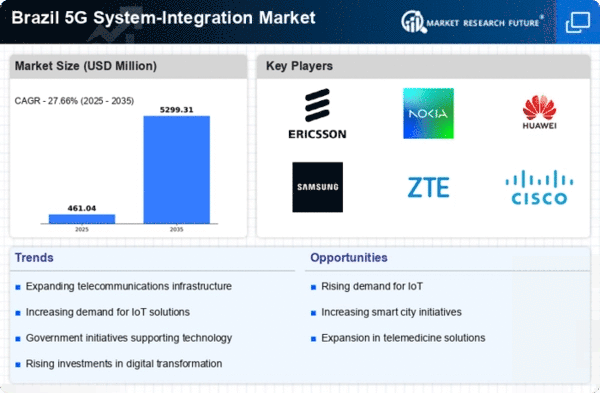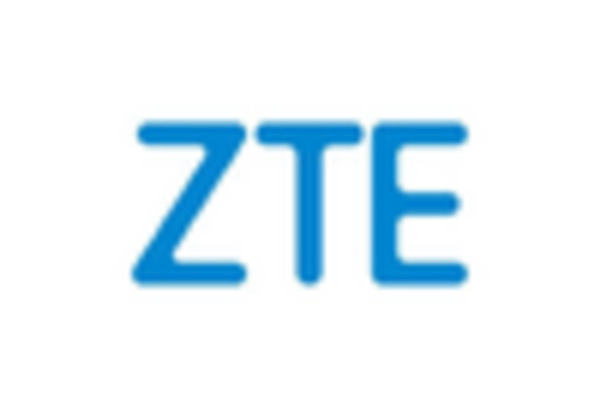Emergence of IoT Applications
The emergence of IoT applications is significantly influencing the 5G System-Integration Market in Brazil. With the proliferation of connected devices, the demand for seamless integration of these devices into 5G networks is increasing. In 2025, it is projected that Brazil will have over 200 million IoT devices connected, creating a substantial need for efficient system integration solutions. This trend is particularly evident in sectors such as agriculture, healthcare, and transportation, where IoT applications can enhance operational efficiency and data management. The integration of 5G systems is essential for enabling real-time data processing and communication among IoT devices, thereby driving market growth and innovation in various industries.
Increased Focus on Cybersecurity
As the 5G System-Integration Market expands in Brazil, the focus on cybersecurity becomes increasingly critical. The deployment of 5G networks introduces new vulnerabilities, making robust security measures essential. In 2025, it is anticipated that cybersecurity spending in the telecommunications sector will exceed $2 billion, reflecting the growing concern over data breaches and cyber threats. Companies are likely to invest in advanced security solutions to protect their networks and customer data. This heightened emphasis on cybersecurity not only drives demand for integrated security solutions but also influences the overall growth of the 5g system-integration market. Ensuring secure and reliable network operations is paramount for fostering consumer trust and encouraging widespread adoption of 5G technologies.
Government Initiatives and Policies
Government initiatives and policies play a crucial role in shaping the 5G System-Integration Market in Brazil. The Brazilian government has implemented various regulatory frameworks aimed at facilitating the deployment of 5G networks. For instance, the National Telecommunications Agency (ANATEL) has been proactive in auctioning 5G spectrum, which is expected to generate revenues exceeding $1 billion. These policies not only encourage investment in infrastructure but also promote competition among service providers. Additionally, the government's focus on digital inclusion and connectivity in rural areas is likely to drive the adoption of 5G technologies. As a result, the 5g system-integration market is poised for growth, supported by favorable regulatory conditions and strategic government initiatives.
Advancements in Technology and Innovation
Technological advancements and innovation are pivotal drivers of the 5G System-Integration Market in Brazil. The rapid evolution of technologies such as artificial intelligence (AI), machine learning, and edge computing is transforming the landscape of telecommunications. In 2025, it is expected that investments in AI-driven network management solutions will increase by 30%, enhancing the efficiency of 5G system integration. These innovations enable operators to optimize network performance, reduce latency, and improve user experiences. Moreover, the integration of advanced technologies facilitates the development of new applications and services, further propelling the growth of the 5g system-integration market. As companies strive to stay competitive, embracing technological advancements becomes essential for success.
Rising Demand for High-Speed Connectivity
The increasing demand for high-speed connectivity in Brazil is a primary driver for the 5G System-Integration Market. As businesses and consumers seek faster internet speeds, the need for robust 5G infrastructure becomes evident. In 2025, it is estimated that mobile data traffic in Brazil will reach approximately 10 exabytes per month, indicating a substantial growth in data consumption. This surge necessitates advanced system integration solutions to manage and optimize network performance. Furthermore, the Brazilian government has been actively promoting digital transformation initiatives, which further fuels the demand for 5G technologies. The integration of 5G systems is essential for supporting various applications, including IoT, smart cities, and enhanced mobile broadband, thereby driving market growth.
















